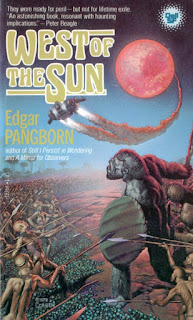I can't remember where I picked this up. I know that Robert Silverberg is a fairly prolific sci-fi author and have never read anything by him. Lost Race of Mars is a Scholastic book, written for late elementary school kids and probably something I would have dug back then. I was hoping to get a teeny taste for Silverberg and more importantly a bit of insight into the kind of sci-fi schoolkids would be reading in 1960 when it was published.
The Chambers are the classic '50s nuclear family, father is a scientist, mother is a homemaker and Sally and Jim keen brother and sister. The year is 2017 and earth has a colony on Mars. Dr. Chambers (the dad) receives a grant to go and study there for a year. There is evidence that there was an ancient race on Mars but most people believe them to be long dead. There are plants, animals and a bit of water, even thin oxygen (either Silverberg was fudging it for a kids book or they really did not have much knowledge about the solar system back then). When the family gets there, they do not receive a friendly welcome. The ethos is one of hard work and practicality and they are seen as freeloaders, using up precious oxygen and resources and not contributing anything tangible. The father struggles to get the equipment he needs. The children are particularly mean and Sally and Jim find themselves ostracized. They decide to sneak out on their own to see if they can find the martians.
It's a fun, quick little read, simplistic and not super realistic. I will slip it into my daughter's shelf and maybe she will chance upon it one day in the future (assuming we aren't dragging a sled with our bare necessities across the wasteland). I will be curious to see what she thinks about it.
Here is a nice blog post giving a bit of history on the book and reference material on Silverberg and the illustrator, Leanard Kessler.
The Jellyfish Season By Mary Downing Hahn
2 days ago


















